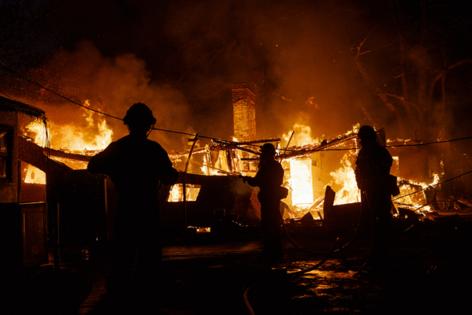Electric customers to pay $9 billion more to California wildfire fund under proposed bill
Published in News & Features
LOS ANGELES — California electric customers would pay $9 billion more to shore up the state’s wildfire fund under a last-minute deal reached behind closed doors that was introduced as legislation on Wednesday.
Southern California Edison, and the state’s two other large for-profit electric companies, had been lobbying Gov. Gavin Newsom and legislative leaders, urging them to pass legislation to replenish the state’s $21-billion fund that pays for damages of utility-caused fires.
State officials have warned the fund could be wiped out by damages from the Eaton fire, which killed 19 people and destroyed a large swath of Altadena on Jan. 7.
Customers of the three utilities are already on the hook for contributing $10.5 billion to the original fund through a surcharge of about $3 on their monthly bills.
If approved, the bill amendments made on Wednesday would have customers pay $9 billion more by extending that surcharge by 10 years beyond 2035, when it was set to expire.
Under the deal, the three electric companies’ shareholders would also pay an additional $9 billion into the fund. That means the fund would increase by $18 billion if the legislation, known as SB 254, passes.
Consumer advocates and environmentalists tracking the bill said they were still trying to understand all the provisions of the 229-page bill, which had been debated in hearings in recent months, but was then significantly amended without public input. The new draft of the bill was published at 9:12 a.m. on Wednesday.
“It’s a complete gut and amend,” said Bernadette Del Chiaro, senior vice president at the Environmental Working Group. “It’s an end run around the normal legislative process.”
The complex proposal was introduced just days before the state legislature’s session ends, which means it may receive little public debate.
The session was scheduled to end on Friday, but any amendments must be public for 72 hours, which would push a vote to Saturday morning.
Mark Toney, executive director of The Utility Reform Network, a consumer group, said he was disappointed that ratepayers — who are already paying the country’s second highest electric rates — would have to pay more. But he pointed to some measures that could help reduce the upward pressure on bills.
For example, utilities would be required to finance some expensive transmission projects through a lower-cost method of public financing that legislators said could save ratepayers $3 billion.
Toney said after reviewing the bill’s language his group planned to support it even though it “falls short of addressing the growing affordability crisis.”
Assemblymember Cottie Petrie-Norris, D-Irvine, the bill’s co-author, defended the last minute amendments, saying the legislature needed to move quickly to bolster the fund as the wildfire season begins in California.
She said many of the provisions added to SB 254, including the public financing of transmission lines, had been included in other bills that had been repeatedly been debated in public hearings.
Petrie-Norris, who is chair of the Assembly Utilities and Energy Committee, defended the process and said that she believed electric customers were getting “a good deal” since half the $18 billion addition into the fund would come from utility shareholders.
Also, under the plan, she said, the three utilities must spend billions of dollars more on wildfire prevention costs, which they can’t earn a profit on.
The share prices of Edison International, Pacific Gas & Electric, and Sempra, the parent company of San Diego Gas & Electric all rose Wednesday on the news.
Newsom and lawmakers created the state wildfire fund in 2019 through a bill known as AB 1054 to protect the three utilities from bankruptcy in the event their electric lines sparked a catastrophic wildfire.
Under the law’s protective measures, Edison could pay nothing or just a fraction of the damages for the Eaton fire if its equipment is found to have sparked the fire.
A representative for Newsom did not immediately respond to a request for comment.
The investigation into the fire is ongoing. Edison has said a leading theory is that a century-old transmission line, not used since the 1970s, somehow reenergized and sparked the blaze.
The insured property losses alone could be as much as $15.2 billion, according to an estimate released in July by state officials. That amount does not include uninsured losses or damages beyond those to property, such as wrongful death claims. A study by UCLA estimated losses at $24 billion to $45 billion.
Damages from the Palisades fire, which also ignited on Jan. 7, are not covered by the state wildfire fund. The city of Los Angeles’ Department of Water and Power, a municipal utility, services the area of Pacific Palisades destroyed by that fire.
Only customers of Edison, PG&E and San Diego Gas & Electric pay to support the wildfire fund. And only those three utilities are covered by its protections.
_____
©2025 Los Angeles Times. Visit at latimes.com. Distributed by Tribune Content Agency, LLC.







Comments